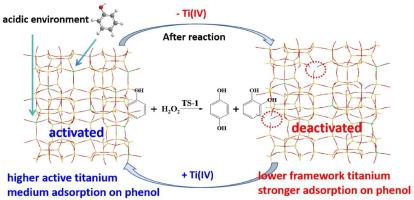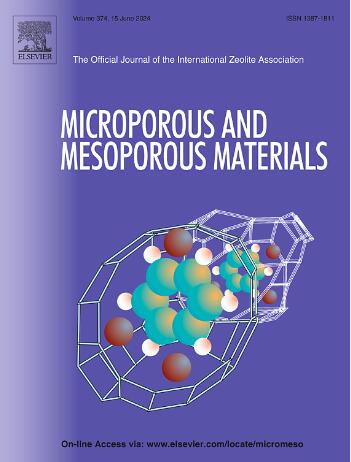Deactivation and regeneration through vapor-phase titanium supplementation of hierarchical TS-1 zeolite for the hydroxylation of phenol
IF 4.7
3区 材料科学
Q1 CHEMISTRY, APPLIED
引用次数: 0
Abstract
Deactivation and regeneration of solid catalysts are key factors that constrain their industrial application. This study investigates the deactivation behavior of hierarchical TS-1 zeolite in the phenol hydroxylation reaction and proposes effective regeneration strategy. The results reveal that the main problem of catalyst deactivation is the loss of active titanium component due to the acid environment of the reaction system and the coordination of phenol on the catalyst. The loss of titanium component alters its adsorption capacity on phenol and catalytic activity. Consequently, this paper introduces the vapor-phase titanium supplementation method to regenerate the deactivated TS-1 zeolite with hierarchical pores by replenishing titanium, thereby restoring the selectivity of catalyst. This research contributes to a deeper understanding of the deactivation behavior of TS-1 zeolite in the phenol hydroxylation reaction and provides insights for the development of more effective catalyst regeneration methods.

分级TS-1沸石气相补钛对苯酚羟基化失活和再生的影响
固体催化剂的失活和再生是制约其工业应用的关键因素。本文研究了分级TS-1沸石在苯酚羟基化反应中的失活行为,并提出了有效的再生策略。结果表明,催化剂失活的主要问题是由于反应体系的酸性环境和苯酚在催化剂上的配位作用导致活性钛组分的损失。钛组分的损失改变了其对苯酚的吸附能力和催化活性。因此,本文介绍了气相补钛的方法,通过补钛使失活的TS-1分子筛再生,从而恢复催化剂的选择性。本研究有助于深入了解TS-1沸石在苯酚羟基化反应中的失活行为,并为开发更有效的催化剂再生方法提供见解。
本文章由计算机程序翻译,如有差异,请以英文原文为准。
求助全文
约1分钟内获得全文
求助全文
来源期刊

Microporous and Mesoporous Materials
化学-材料科学:综合
CiteScore
10.70
自引率
5.80%
发文量
649
审稿时长
26 days
期刊介绍:
Microporous and Mesoporous Materials covers novel and significant aspects of porous solids classified as either microporous (pore size up to 2 nm) or mesoporous (pore size 2 to 50 nm). The porosity should have a specific impact on the material properties or application. Typical examples are zeolites and zeolite-like materials, pillared materials, clathrasils and clathrates, carbon molecular sieves, ordered mesoporous materials, organic/inorganic porous hybrid materials, or porous metal oxides. Both natural and synthetic porous materials are within the scope of the journal.
Topics which are particularly of interest include:
All aspects of natural microporous and mesoporous solids
The synthesis of crystalline or amorphous porous materials
The physico-chemical characterization of microporous and mesoporous solids, especially spectroscopic and microscopic
The modification of microporous and mesoporous solids, for example by ion exchange or solid-state reactions
All topics related to diffusion of mobile species in the pores of microporous and mesoporous materials
Adsorption (and other separation techniques) using microporous or mesoporous adsorbents
Catalysis by microporous and mesoporous materials
Host/guest interactions
Theoretical chemistry and modelling of host/guest interactions
All topics related to the application of microporous and mesoporous materials in industrial catalysis, separation technology, environmental protection, electrochemistry, membranes, sensors, optical devices, etc.
 求助内容:
求助内容: 应助结果提醒方式:
应助结果提醒方式:


